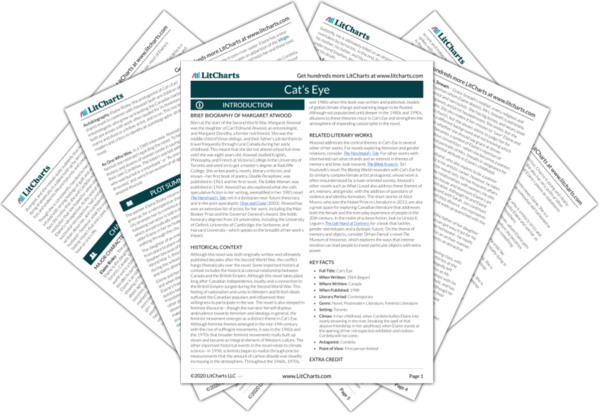Stephen Risley Quotes in Cat’s Eye
Time is not a line but a dimension, like the dimensions of space. If you can bend space you can bend time also, and if you knew enough and could move faster than light you could travel backward in time and exist in two places at once […] But I began then to think of time as having a shape, something you could see, like a series of liquid transparencies, one laid on top of another. You don’t look back along time but down through it, like water. Sometimes this comes to the surface, sometimes that, sometimes nothing. Nothing goes away.
We like scabs. We pick them off—there isn’t room for a whole arm or leg under the microscope—and turn the magnification up as high as it will go. […] We look at earwax, or snot, or dirt from our toes, checking first to see that there’s no one around: we know without asking that such things would not be approved of. Our curiosity is supposed to have limits, though these have never been defined exactly.
We cross the wooden bridge on the way home from school. I am walking behind the others. Through the broken boards I can see the ground below. I remember my brother burying his jar full of puries, of waterbabies and cat’s eyes, a long time ago, down there somewhere under the bridge. The jar is still there in the earth, shining in the dark, in secret. I think about myself going down there alone despite the sinister unseen men, digging up the treasure, having all that mystery in my hands. I could never find the jar, because I don’t have the map. But I like to think about things the others know nothing about.
My brother Stephen died five years ago. I shouldn’t say died: was killed. I try not to think of it as murder, although it was, but as some kind of accident, like an exploding train. Or else a natural catastrophe, like a landslide. What they call for insurance purposes an act of God. He died of an eye for an eye, or someone’s idea of it. He died of too much justice.

Stephen Risley Quotes in Cat’s Eye
Time is not a line but a dimension, like the dimensions of space. If you can bend space you can bend time also, and if you knew enough and could move faster than light you could travel backward in time and exist in two places at once […] But I began then to think of time as having a shape, something you could see, like a series of liquid transparencies, one laid on top of another. You don’t look back along time but down through it, like water. Sometimes this comes to the surface, sometimes that, sometimes nothing. Nothing goes away.
We like scabs. We pick them off—there isn’t room for a whole arm or leg under the microscope—and turn the magnification up as high as it will go. […] We look at earwax, or snot, or dirt from our toes, checking first to see that there’s no one around: we know without asking that such things would not be approved of. Our curiosity is supposed to have limits, though these have never been defined exactly.
We cross the wooden bridge on the way home from school. I am walking behind the others. Through the broken boards I can see the ground below. I remember my brother burying his jar full of puries, of waterbabies and cat’s eyes, a long time ago, down there somewhere under the bridge. The jar is still there in the earth, shining in the dark, in secret. I think about myself going down there alone despite the sinister unseen men, digging up the treasure, having all that mystery in my hands. I could never find the jar, because I don’t have the map. But I like to think about things the others know nothing about.
My brother Stephen died five years ago. I shouldn’t say died: was killed. I try not to think of it as murder, although it was, but as some kind of accident, like an exploding train. Or else a natural catastrophe, like a landslide. What they call for insurance purposes an act of God. He died of an eye for an eye, or someone’s idea of it. He died of too much justice.











